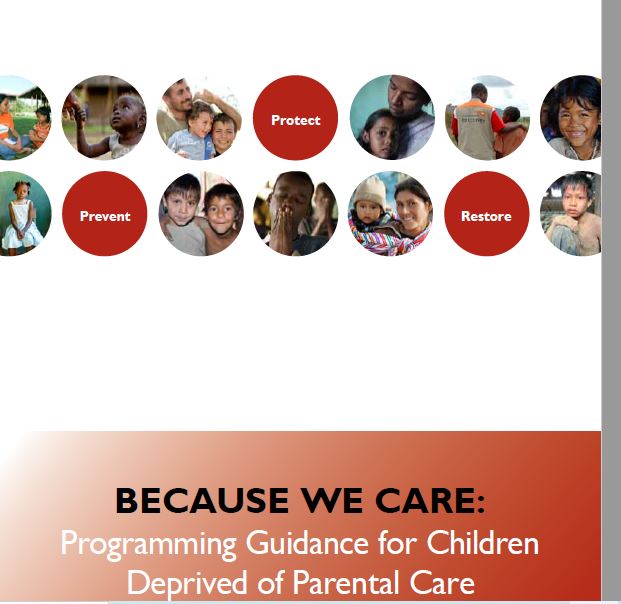
Because We Care: Programming Guidance for Children Deprived of Parental Care

These general recommendations are explained and expanded upon in the two main sections of the paper: (1) general alternative care principles, and (2) analysis of alternative care models.
Section 1 includes principles and guidelines that can and should be applied to all alternative care interventions. These principles are divided into seven categories: developing foundations for alternative care, strengthening families, strengthening communities, engaging government, empowering children, supporting caregivers and developing professional practices.
Section 2 then analyses five models of alternative care in more detail: kinship care, foster care, children living independently, group homes and children’s villages. Each section includes a list of benefits and concerns, programming suggestions for implementation and case studies to aid reflection on practical application. Section 2 has a modular structure. Each of the five models developed in this section can be read by itself, independent of the others, for those interested in only one or a few of the models. Therefore, there is repetition of important principles among models. Throughout the paper specific sections are identified as ‘hot topics’ for the purpose of encouraging discussion on a topic that is debated among sources.
While each alternative care model needs to be analysed individually, general principles can and should be applied across all alternative care interventions. The challenge in defining general principles is accounting for the variety and range of contexts to which they are to be applied. This paper presents principles that must be adjusted to the varying capacity levels of the communities and governments in which they are to be applied. In each context, it must be determined who is responsible and able to provide quality alternative care for CDOPC, and the role of non-governmental organisations (NGOs) must be defined accordingly. The greatest responsibilities should default to national governments and community-based organisations. However, in some contexts NGOs may need to support government for a limited period of time, while the local capacity for care is increased. The general principles below provide guidance for alternative care as implemented by national governments, community-based organisations or NGOs. The sources for alternative care principles are vast and targeted to a variety of audiences. This paper attempts to consolidate existing knowledge and reframe it to speak to the concerns of international NGOs, in order to improve the implementation of alternative care models.
Feedback and Comment